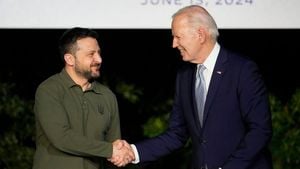Recent developments surrounding Israeli settlements and political tensions are capturing headlines around the globe, with significant changes underway as Donald Trump prepares to assume the presidency again. The interplay between Trump's administration and Israeli politics creates reverberations felt not only within Israel but also across international relations, especially with the United States.
The political atmosphere is thick with anxiety as the potential resurgence of extreme right policies under Trump looms large. Following Israel's latest military operations, several cabinet members have openly discussed aggressive settlement expansion and annexation plans, stirring tensions with Palestinian groups. The response from the global community has been one of caution as past aggressions surface from the shadows of history.
Israeli politicians, particularly from the far right, are seizing on Trump's win to push for more radical strategies. Bezalel Smotrich, Israel's Finance Minister, and Itamar Ben-Gvir, the National Security Minister, have become frontline advocates for resettlement initiatives, using their authority to propose plans for immediate annexation of territories deemed strategic.
At recent events, these politicians have not only expressed their intent to bolster settlements but have celebrated what they view as Trump’s tacit approval of their hardline approaches. "We are witnessing the dawn of a new era of settlement expansion and Jewish sovereignty over biblical lands,” Ben-Gvir proclaimed at one gathering, rallying support from right-wing factions eager for action.
But this push for expansion raises substantial concerns among moderates within Israel and the broader international community. Detractors point to the deteriorative effects of settlement policies, which threaten to dismantle the prospects for peace and stability. The urgency of establishing lasting agreements with Palestinian representatives becomes even more pronounced against the backdrop of rising extremism and violence.
The recent spike in violence has spurred calls for action among moderate groups, where voices echo from within Israeli society demanding negotiations rather than escalation. Numerous demonstrations held across major cities have drawn attention to the need for dialogue and mutual recognition, emphasizing human rights and the necessity to end violence.
The stark difference between government positions and public sentiment is becoming increasingly evident. While ministers advocate for settlement growth, many ordinary Israelis oppose policies seen as exacerbatory to the long-term conflict. "We cannot allow ideological fervor to blind us from the human cost of these actions. Peace is fundamental, and we must pursue it actively," stated one protestor.
Israeli leadership's commitment to expansionist policies, especially following the traumatic events of October 7, 2023, when Hamas militants launched unprecedented attacks, adds another layer of complexity. The casualties from both sides have ignited fiery debates about the future of Israeli democracy and the moral obligations of its leaders.
Despite the current turmoil, Netanyahu’s government has shown little inclination to shift course. Instead, the Prime Minister appears to be doubling down on support from loyalist factions within his cabinet, even as criticisms from the left continue to mount. Elements within the Knesset are adopting more radical viewpoints, creating divisions reminiscent of previous conflicts over land rights and national identity.
Critics assert this pivot toward extremism endangers not only Israeli relations with Palestinian groups but also with international allies, primarily the United States. A fractured relationship could emerge from porous policies, as noted by experts who highlight the already thin margins influencing American support for Israel. Following the announcement of new legislative pushes by the Knesset, anticipated pushback from Western nations could shift the dynamics of aid and support, impacting Israel's strategic interests.
Yet, the reality of continued occupation remains starkly present. Supporters of settlement expansion, emboldened by Trump’s previous administration, see such governmental actions as aligning with personal aspirations for nationalistic rebirth rather than as components of diplomatic compromise.
Within this swirling uncertainty, voices advocating for moderation increasingly call for recognizing Palestinian rights amid Israel's expansionist inclinations. The stark realities reflected through human suffering demand urgent action, for many agree: without substantial change, the prospect of peace slips even farther from reach.
Both Israeli citizens and global observers are left grappling with hard-hitting questions about the future. Can the desire for long-held territorial claims outweigh the pressing need for peace and coexistence? Will working toward settlements destroy not only the prospect of lasting peace but also the very fabric of Israeli society?
The U.S., under new leadership, has the potential to reshape its stance toward these contentious policies. Biden's administration may find itself at yet another crossroads, trying to balance support for Israeli interests against the pressing demands for social justice and rights for Palestinians. Can the two-state solution prevail, or are the seeds of extremism too deeply rooted?
The tension spills over beyond the borders of Israel, reflecting broader themes of governance and extremism seen everywhere today. Political polarization and the rise of hardline views risk blurring the line between policy and provocation, leaving fallout on both international and domestic fronts.
For now, Israeli society must confront its internal conflict, grappling with its identity amid external pressures. The balance between security and human rights will continue to shape discussions for years to come, as political currents gain momentum. Whether these settlements lead to future prosperity or continued hardship remains yet to be seen.
One thing remains clear: the road to lasting peace is fraught with challenges, questions, and complex political ties. The global community watches, hoping for diplomacy to prevail where ideologies falter. Will this momentous period bring about transformation, or merely hold Israel to the brink of another tragic chapter?



